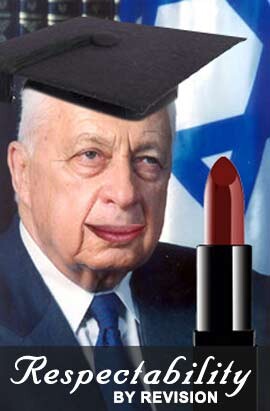The Electronic Intifada 15 April 2005
Some of the most committed Israeli opponents of their state’s illegal military occupation of the Palestinian territories have recently expressed serious reservations about, if not strident opposition to, the Palestinian call for boycott of Israel’s academic and cultural institutions. We think that their concerns are worth addressing.

Almost all of the publicized reservations we have seen are prefaced with moral support for the right of Palestinians to resist the occupation — nonviolently, most would write — even by calling for boycotts to achieve that goal. A common theme in their antagonism to the academic boycott, however, is the pragmatic consideration that such a boycott may be “counterproductive” in the struggle to end the occupation.
They allow themselves to raise this objection because they regard themselves as partners of Palestinians in the anti-occupation camp, not as outsiders patronizing us. In some cases, this premise is valid. Most of the time, however, it is not. Israelis who arrogate to themselves the exclusive right to arbitrate every issue dealing with the Palestinians ought to think twice about their self-appointed role as sole licensers of the form the anti-occupation struggle should take.
Israelis who are opposed to the occupation should be doing so on moral grounds, above everything else, and should not dictate the agenda of the struggle. This remains a struggle of Palestinians and their supporters — including conscientious Israelis — led by Palestinians against Israel’s racist and colonial policies. It is high time to recognize this profound fact.
Another crucial issue that demands consideration here is the fact that even conscientious Israelis are objectively in a situation of conflict of interest: boycotts, even of the most sensitive and nuanced types, will in all likelihood hurt their interests. Does this morally rob them of the right to opine or give Palestinians advice about boycott, as their views will always be tainted by self-interest? No, but the fact that their interests are on the line should not be ignored either in judging the degree of fairness of their opinions. A few principled academics, like Ilan Pappe, have decisively overcome this conflict of interest by declaring their readiness to accept the price that they may have to pay as a result of implementing any meaningful boycott against Israeli academic institutions. Such admirable moral clarity and consistency should set an example to other Israeli academics.
Regardless of intentions and moral considerations, we do think it is important to lay out the most recurrent and serious pragmatic/political arguments raised by progressive Israelis, and to respond to each of them with due deliberation.
The “counterproductiveness” claim – by far the most potent of all assertions – rests on the following arguments:
1. Academic boycotts in general hurt the one sector in the oppressor society that is most likely to be sympathetic to the struggle of the oppressed. Israel is no exception, it is held.
Even if this holds in other places, in Israel it simply does not. Israeli academics by and large serve in the occupation army, and hardly ever publicly denounce Israel’s occupation, its system of racial discrimination against its own Palestinian citizens or its obdurate denial of the internationally-sanctioned rights of Palestinian refugees. This constitutes collusion — even if passive, at times — with their state’s criminal oppression of the Palestinian people. Moreover, Israeli academics’ organizations, such as university senates or professional associations, have been totally silent on the conduct of those academics who have contributed to the occupation regime either through direct service as advisors or as producers of “knowledge” useful to the project of control, oppression, and occupation. As far as we know, no racist or complicit academic has ever been publicly censured by representative bodies or associations of academics. Many of those Israelis who object to the academic boycott admit, quite freely, the complicity of the academy as a whole in the colonial project, both historically and in the present.
2. Academic boycott by its very nature contradicts academic freedom.
This claim needs to be examined carefully. We think that the freedom that Israeli academics appear keen to preserve is the freedom to continue being scholars, i.e. to have an uninterrupted flow of research funds, to continue to get grants to be released from teaching, to take sabbaticals, to continue to be able to write, engage in scholarly debate, and to do all the things respectable academics are supposed to do. But can they or should they be able to enjoy these freedoms (which sound more like privileges to us) without any regard to what is going on outside the walls of the academy, to the role of their institutions in the perpetuation of colonial rule? We are faced here again with the problem of Israelis seeing the world from their vantage point, and assuming — and demanding — that others do the same. Why does the world owe it to Israel’s academics to help them perpetuate their privileged position?
3. Israeli academics opposed to the occupation are themselves largely antagonistic to boycott. Insisting on boycott, therefore, runs the risk of losing them. Palestinians cannot afford that, particularly given their evident political weakness.
Although the views of our Israeli supporters regarding methods of struggle matter to us, they are not our only, or even our most significant, consideration. As argued above, we hope that their opposition to the crimes committed in their names is based on more than pragmatic considerations, and that they are capable of seeing themselves in the wider context of the struggle, thereby overcoming the tendency to feel that they lie at the center of the universe. The boycott is a morally sound means of struggle that challenges the world to force Israeli compliance with international law; it therefore serves Palestinian interests in the struggle for emancipation, self-determination and equality. That is our most urgent consideration.
4. Conscientious Israelis who are exempted from the call for boycott will be isolated even further by their Israeli colleagues if they accept such a privilege. This will hurt their standing and diminish their ability to influence those colleagues’ attitudes towards the occupation.
This is even less relevant than the consideration raised in the third claim! The above response amply addresses it.
5. Although the Palestinian call for boycott explicitly calls for “institutional” not individual boycott, by exempting “conscientious Israeli academics” opposed to occupation and oppression, it implies that the rest of Israeli academic individuals are to be boycotted. This apparent contradiction sheds some doubt on the sincerity or coherence of the Palestinian call.
Although as a matter of principle we refuse to be put in the seat of the accused in this not-so-innocent case of questioning our integrity, we shall respond to this charge. One year after the Palestinian call for boycott was issued, PACBI’s record of public statements, press releases, published articles and letters should put to rest any doubts about our moral and political consistency. Our Call explicitly and unequivocally calls for institutional boycott, period. The fact that we go out of our way to “Exclude from the above actions against Israeli institutions any conscientious Israeli academics and intellectuals opposed to their state’s colonial and racist policies” follows from our realization that there is always a grey area where an academic may be perceived as representing her/his institution rather than her/himself. We were cautious and nuanced enough to address that eventuality. This does not imply anything beyond what it says. Our discourse has always avoided double-talk and mixed messages, unlike that of most of our detractors.
Silence in the South African Context
One final and crucial point to make is where were those critics of boycott during the years of comprehensive, blanket boycotts (in all fields, including academia) of the apartheid regime in South Africa? Did they object then to the far more stringent criteria of the boycott? If not, it is fair to conclude that they must be either hypocritical or else they have good reasons to believe that such punitive measures cannot be as effective in the Israeli apartheid case as in its South African predecessor. We have yet to read or hear one good argument supporting this unfounded belief. The burden of proof lies flatly on their laps, not ours.
Treating Israel as a state outside of history, unaccountable to international law and morally untouchable has got to come to an end. It reflects moral inconsistency and political blindness; furthermore, it serves to perpetuate Israel’s rarely matched oppression of the people of Palestine, and, by extension, it inhibits the struggle for genuine peace based on justice and the universal principle of equal humanity.
Omar Barghouti and Lisa Taraki are founding members of the Palestinian Campaign for the Academic and Cultural Boycott of Israel (PACBI). The full text of PACBI’s Call for Boycott can be read at: right2edu.birzeit.edu/news/article178.



